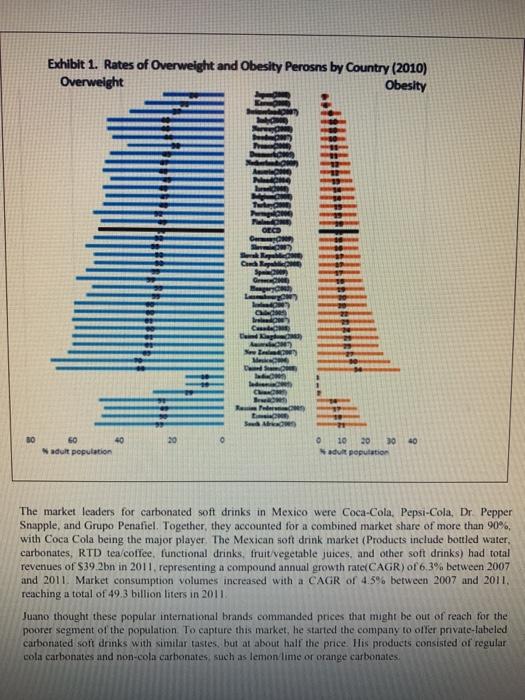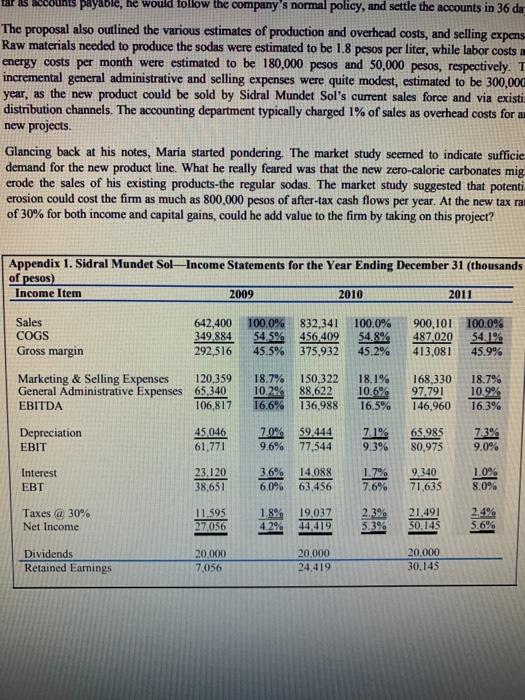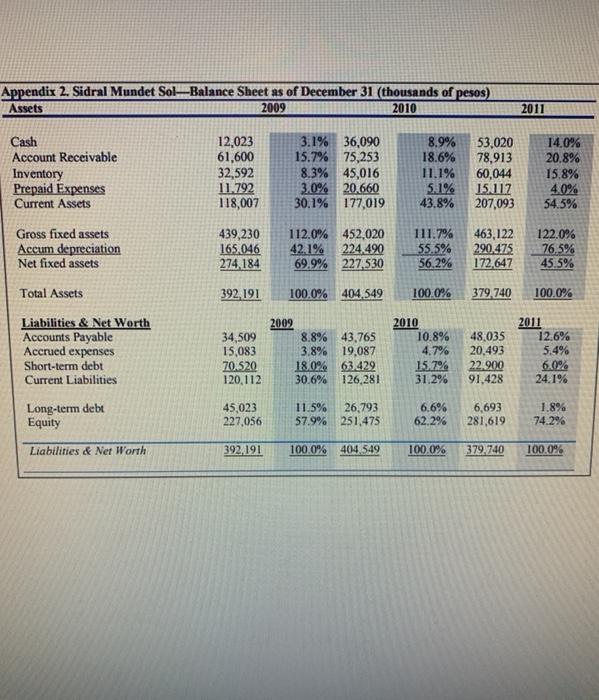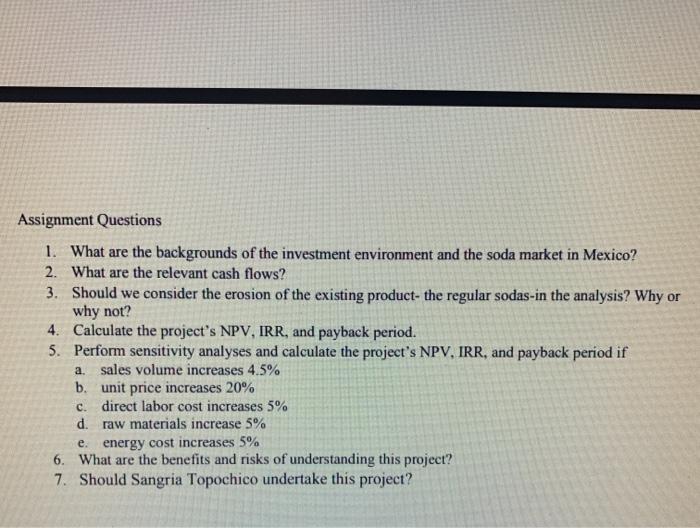Answered step by step
Verified Expert Solution
Question
1 Approved Answer
Four photos attached. Exhibit 1. Rates of Overweight and Obesity Perosns by Country (2010) Overweight Obesity Sow Bew RT Sub 30 20 o o 40




Four photos attached.
Exhibit 1. Rates of Overweight and Obesity Perosns by Country (2010) Overweight Obesity Sow Bew RT Sub 30 20 o o 40 60 40 adult population 10 30 adult population The market leaders for carbonated soft drinks in Mexico were Coca-Cola, Pepsi-Cola, Dr Pepper Snapple, and Grupo Penafiel. Together, they accounted for a combined market share of more than 90%, with Coca Cola being the major player. The Mexican soft drink market (Products include bottled water, carbonates, RTD tea/coffee, functional drinks, fruit/vegetable juices, and other soft drinks) had total revenues of $39.2bn in 2011, representing a compound annual growth rate(CAGR) of 6,3% between 2007 and 2011. Market consumption volumes increased with a CAGR of 4.5% between 2007 and 2011, reaching a total of 49.3 billion liters in 2011 Juano thought these popular international brands commanded prices that might be out of reach for the poorer segment of the population to capture this market. he started the company to offer private-labeled carbonated soft dn with similar tastes al about hall price. His products consisted of regular cola carbonates and non-cola carbonates, such as lemon lime or orange carbonates payable, he would follow the company's normal policy, and settle the accounts in 36 da The proposal also outlined the various estimates of production and overhead costs, and selling expens Raw materials needed to produce the sodas were estimated to be 1.8 pesos per liter, while labor costs energy costs per month were estimated to be 180,000 pesos and 50,000 pesos, respectively. T incremental general administrative and selling expenses were quite modest, estimated to be 300,000 year, as the new product could be sold by Sidral Mundet Sol's current sales force and via existi distribution channels. The accounting department typically charged 1% of sales as overhead costs for a new projects. Glancing back at his notes, Maria started pondering. The market study seemed to indicate sufficie demand for the new product line. What he really feared was that the new zero-calorie carbonates mig erode the sales of his existing products-the regular sodas. The market study suggested that potenti erosion could cost the firm as much as 800,000 pesos of after-tax cash flows per year. At the new tax ra of 30% for both income and capital gains, could he add value to the firm by taking on this project? Appendix 1. Sidral Mundet SolIncome Statements for the Year Ending December 31 (thousands of pesos) Income Item 2009 2010 2011 100.0% 54 5% 45.5% 832,341 456,409 375,932 100.0% 54,8% 45.2% 900,101 100.0% 487,020 54.1% 413,081 45.9% Sales 642,400 COGS 349 884 Gross margin 292,516 Marketing & Selling Expenses 120,359 General Administrative Expenses 65,340 EBITDA 106,817 18.7% 10.2% 16.6% 150,322 88,622 136,988 18.1% 10.6% 16.5% 168,330 97,791 146,960 18.7% 10.9% 16.3% Depreciation EBIT 45,046 61,771 7.0% 9.6% 59.444 77,544 7.1% 9.3% 65.985 80,975 7.3% 9.0% Interest 23.120 38,651 3.6% 6.0% 14.088 63,456 1.7% 7.6% 9,340 71,635 1.0% 8.0% Taxes @ 30% Net Income 11.595 27.056 18% 4.2% 19,037 44.419 2.3% 5.3% 21,491 50.145 2.4% 5.6% Dividends Retained Earnings 20,000 7,056 20,000 24,419 20.000 30,145 Appendix 2. Sidral Mundet Sol-Balance Sheet as of December 31 (thousands of pesos) Assets 2009 2010 2011 Cash Account Receivable Inventory Prepaid Expenses Current Assets 12,023 61,600 32,592 11.792 118,007 3.1% 36,090 15.7% 75,253 8.3% 45,016 3.0% 20,660 30.1% 177,019 8.9% 18.6% 11.1% 5.1% 43.8% 53,020 78,913 60,044 15117 207,093 14.0% 20.8% 15.8% 4.0% 54.5% Gross fixed assets Accum depreciation Net fixed assets 439,230 165.046 274.184 112.0% 452,020 42.1% 224.490 69.9% 227530 111.7% 55.5% 56.2% 463,122 290.475 172.647 122.0% 76,5% 45.5% Total Assets 392, 191 100.0% 404,549 100.0% 379,740 100.0% Liabilities & Net Worth Accounts Payable Accrued expenses Short-term debt Current Liabilities 34,509 15,083 70.520 120,112 2009 8.8% 3.8% 18.0% 30.6% 43,765 19,087 63429 126,281 2010 10.8% 4.7% 15.7% 31.29 48,035 20,493 22.900 91.428 2011 12.6% 5.4% 6.0% 24.1% Long-term debt Equity 45,023 227,056 11.5% 26,793 57.9% 251,475 6.6% 62.2% 6,693 281,619 1.8% 74.2% Liabilities & Net Worth 392.191 100.0% 404.549 100.0% 379.740 100.0% Assignment Questions 1. What are the backgrounds of the investment environment and the soda market in Mexico? 2. What are the relevant cash flows? 3. Should we consider the erosion of the existing product-the regular sodas-in the analysis? Why or why not? 4. Calculate the project's NPV, IRR, and payback period. 5. Perform sensitivity analyses and calculate the project's NPV, IRR, and payback period if a. sales volume increases 4.5% b. unit price increases 20% direct labor cost increases 5% d. raw materials increase 5% e. energy cost increases 5% 6. What are the benefits and risks of understanding this project? 7. Should Sangria Topochico undertake this project? C. Exhibit 1. Rates of Overweight and Obesity Perosns by Country (2010) Overweight Obesity Sow Bew RT Sub 30 20 o o 40 60 40 adult population 10 30 adult population The market leaders for carbonated soft drinks in Mexico were Coca-Cola, Pepsi-Cola, Dr Pepper Snapple, and Grupo Penafiel. Together, they accounted for a combined market share of more than 90%, with Coca Cola being the major player. The Mexican soft drink market (Products include bottled water, carbonates, RTD tea/coffee, functional drinks, fruit/vegetable juices, and other soft drinks) had total revenues of $39.2bn in 2011, representing a compound annual growth rate(CAGR) of 6,3% between 2007 and 2011. Market consumption volumes increased with a CAGR of 4.5% between 2007 and 2011, reaching a total of 49.3 billion liters in 2011 Juano thought these popular international brands commanded prices that might be out of reach for the poorer segment of the population to capture this market. he started the company to offer private-labeled carbonated soft dn with similar tastes al about hall price. His products consisted of regular cola carbonates and non-cola carbonates, such as lemon lime or orange carbonates payable, he would follow the company's normal policy, and settle the accounts in 36 da The proposal also outlined the various estimates of production and overhead costs, and selling expens Raw materials needed to produce the sodas were estimated to be 1.8 pesos per liter, while labor costs energy costs per month were estimated to be 180,000 pesos and 50,000 pesos, respectively. T incremental general administrative and selling expenses were quite modest, estimated to be 300,000 year, as the new product could be sold by Sidral Mundet Sol's current sales force and via existi distribution channels. The accounting department typically charged 1% of sales as overhead costs for a new projects. Glancing back at his notes, Maria started pondering. The market study seemed to indicate sufficie demand for the new product line. What he really feared was that the new zero-calorie carbonates mig erode the sales of his existing products-the regular sodas. The market study suggested that potenti erosion could cost the firm as much as 800,000 pesos of after-tax cash flows per year. At the new tax ra of 30% for both income and capital gains, could he add value to the firm by taking on this project? Appendix 1. Sidral Mundet SolIncome Statements for the Year Ending December 31 (thousands of pesos) Income Item 2009 2010 2011 100.0% 54 5% 45.5% 832,341 456,409 375,932 100.0% 54,8% 45.2% 900,101 100.0% 487,020 54.1% 413,081 45.9% Sales 642,400 COGS 349 884 Gross margin 292,516 Marketing & Selling Expenses 120,359 General Administrative Expenses 65,340 EBITDA 106,817 18.7% 10.2% 16.6% 150,322 88,622 136,988 18.1% 10.6% 16.5% 168,330 97,791 146,960 18.7% 10.9% 16.3% Depreciation EBIT 45,046 61,771 7.0% 9.6% 59.444 77,544 7.1% 9.3% 65.985 80,975 7.3% 9.0% Interest 23.120 38,651 3.6% 6.0% 14.088 63,456 1.7% 7.6% 9,340 71,635 1.0% 8.0% Taxes @ 30% Net Income 11.595 27.056 18% 4.2% 19,037 44.419 2.3% 5.3% 21,491 50.145 2.4% 5.6% Dividends Retained Earnings 20,000 7,056 20,000 24,419 20.000 30,145 Appendix 2. Sidral Mundet Sol-Balance Sheet as of December 31 (thousands of pesos) Assets 2009 2010 2011 Cash Account Receivable Inventory Prepaid Expenses Current Assets 12,023 61,600 32,592 11.792 118,007 3.1% 36,090 15.7% 75,253 8.3% 45,016 3.0% 20,660 30.1% 177,019 8.9% 18.6% 11.1% 5.1% 43.8% 53,020 78,913 60,044 15117 207,093 14.0% 20.8% 15.8% 4.0% 54.5% Gross fixed assets Accum depreciation Net fixed assets 439,230 165.046 274.184 112.0% 452,020 42.1% 224.490 69.9% 227530 111.7% 55.5% 56.2% 463,122 290.475 172.647 122.0% 76,5% 45.5% Total Assets 392, 191 100.0% 404,549 100.0% 379,740 100.0% Liabilities & Net Worth Accounts Payable Accrued expenses Short-term debt Current Liabilities 34,509 15,083 70.520 120,112 2009 8.8% 3.8% 18.0% 30.6% 43,765 19,087 63429 126,281 2010 10.8% 4.7% 15.7% 31.29 48,035 20,493 22.900 91.428 2011 12.6% 5.4% 6.0% 24.1% Long-term debt Equity 45,023 227,056 11.5% 26,793 57.9% 251,475 6.6% 62.2% 6,693 281,619 1.8% 74.2% Liabilities & Net Worth 392.191 100.0% 404.549 100.0% 379.740 100.0% Assignment Questions 1. What are the backgrounds of the investment environment and the soda market in Mexico? 2. What are the relevant cash flows? 3. Should we consider the erosion of the existing product-the regular sodas-in the analysis? Why or why not? 4. Calculate the project's NPV, IRR, and payback period. 5. Perform sensitivity analyses and calculate the project's NPV, IRR, and payback period if a. sales volume increases 4.5% b. unit price increases 20% direct labor cost increases 5% d. raw materials increase 5% e. energy cost increases 5% 6. What are the benefits and risks of understanding this project? 7. Should Sangria Topochico undertake this project? C Step by Step Solution
There are 3 Steps involved in it
Step: 1

Get Instant Access to Expert-Tailored Solutions
See step-by-step solutions with expert insights and AI powered tools for academic success
Step: 2

Step: 3

Ace Your Homework with AI
Get the answers you need in no time with our AI-driven, step-by-step assistance
Get Started


